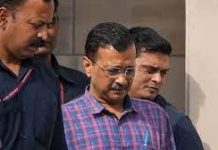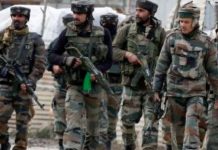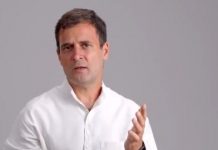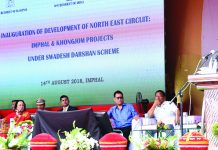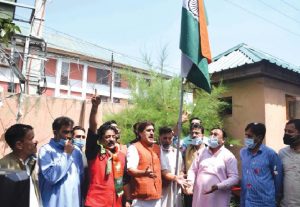 The first anniversary of the annulment of Article 370 on August 5 was a muted affair in J&K. A few small groups of the BJP workers raised the national flag at several places. One of the most conspicuous of such celebrations was held at Lal Chowk in Anantnag where a lone BJP worker Rumisa Rafiq waved and saluted the tricolour amid heavy security bandobast.
The first anniversary of the annulment of Article 370 on August 5 was a muted affair in J&K. A few small groups of the BJP workers raised the national flag at several places. One of the most conspicuous of such celebrations was held at Lal Chowk in Anantnag where a lone BJP worker Rumisa Rafiq waved and saluted the tricolour amid heavy security bandobast.
Later talking to media, Rafiq defended the rescinding of Article 370 saying August 5 will be observed as one of the “most important days” in history. “On this day the Prime Minister Shri Narendra Modiji and Shri Amit Shahji took the decision in the interest of J&K. The daughters of J&K were finally granted their rights. The step has also opened up the avenues for livelihood and development,” Rafiq said. “Kashmiris support the BJP’s decision. The slogan of the BJP is sab ka saath, sab ka vikas. Our party has always worked on the slogan Ek Vidhan, Ek Nishan, Ek Pradhan”.
No other party in the union territory held any programme let alone hit the roads. The National Conference president Dr Farooq Abdullah who was released in March had called a meeting of the leaders of the other parties, but the government didn’t allow them to attend. The party’s vice president Omar Abdullah later tweeted that the administration had prevented the leaders from reaching the venue. Omar also tweeted the pictures of the road outside his house where the security had been deployed in strength to forbid any kind of movement.
Similarly, the celebration was muted in Jammu too and what is more, even in the union territory of Ladakh that was carved out last year as part of the reorganization of J&K. More than Kashmir Valley where the withdrawal of Article 370 that granted J&K its semi-autonomous status under India’s constitution, the subdued response to the first anniversary of the move was a telling comment on how the former state has come to view the unprecedented constitutional decision.
In Jammu, the Panther’s Party leader Harshdev Singh has emerged as a bitter critic of the recently issued domicile laws that have thrown J&K open for settlement by people from outside the union territory.
“There is unease in Jammu. Our demography, culture and identity are getting diluted. Then there is also the issues about jobs. People are also worried about losing these to new domiciles,” said Singh who was also his party’s its lone lawmaker in the last J&K Assembly. “People have been opposing the domicile law. But because of restrictions in place due to the pandemic, people are not able to come out”.
Similarly, a year on, the people at Ladakh harbour deep misgivings about the promised benefits of the loss of J&K’s special status and Ladakh’s separation as a union territory. President of Ladakh Buddhist Association PT Kunzang has publicly expressed fears about the loss of land, jobs, culture, environment and businesses in case the region is not afforded safeguards like other tribal areas.
Rigzin Spalbar, the Congress candidate from Leh echoes this sentiment. “We are just three lakh people and cannot withstand an inflow of 1.3 billion people from across the country,” he told the media.
As things stand, a year on, the Article 370 move has generated a deep unease among the three regions — Kashmir, Jammu and Ladakh — but for largely different reasons. One common thread that runs through the opposition to the post-Article 370 developments in J&K and Ladakh is the growing anxiety about the loss of land, jobs and the consequent dilution of the culture through change in demography. What form this opposition takes in the future politics of the two unioN territories will become clear in the weeks and months to come.
letters@tehelka.com



